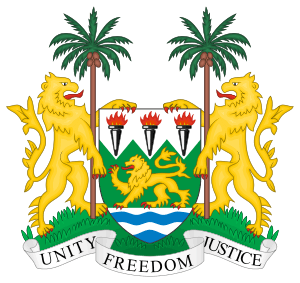Tinga Seisay
Samuel Tinga Khendekha Seisay (22 August 1928 – 4 February 2015) was a Sierra Leonean diplomat and pro-democracy activist.[1][2]
The Honourable Tinga Seisay | |
|---|---|
| Sierra Leone Consul General to the United States | |
| In office 1968–1974 | |
| Monarch | Elizabeth II |
| Prime Minister | Siaka Probyn Stevens |
| Vice PM | Sorie Ibrahim Koroma |
| Preceded by | David Lansana |
| Succeeded by | C.O. Bright |
| Deputy Commissioner Sierra Leone Police Force | |
| In office 1967–1968 | |
| Monarch | Elizabeth II |
| President | Siaka Probyn Stevens |
| Vice President | Sorie Ibrahim Koroma |
| Succeeded by | James Bambay Kamara |
| Personal details | |
| Born | Tinga Khendhaka Seisay August 22, 1928 Mokorewoh, Moyamba, British Sierra Leone |
| Died | February 4, 2015 (aged 86) Freetown, Sierra Leone |
| Resting place | Freetown, Sierra Leone |
| Nationality | Sierra Leonean |
| Relatives | Solomon G. Seisay John Amadu Bangura Ella Koblo Gulama Hindolo Trye |
| Education | St. Edward's Secondary School Police Training School |
| Alma mater | Royal Institute of Technology B.A. Long Island University M.Sc. |
| Occupation | Civil Engineer |
| Profession | Diplomat |
| Committees | United Nations General Assembly |
 |
|---|
| This article is part of a series on the politics and government of Sierra Leone |
|
Legislative |
|
|
|
|
|
Early life
Born to a prominent political family, Seisay was educated at St. Edward's Secondary School. After graduating from the Police Training School at Hastings, he began his career as a law enforcement officer.
After several years with the Sierra Leone Police Force, Seisay traveled to Europe to continue his studies where he read engineering at the Royal Institute of Technology in Sweden. While he was a student, Seisay had a life-changing meeting with Martin Luther King in Stockholm which deepened his interest in nonviolent activism.
Seisay earned a master's degree in political science at Long Island University. He is a Ph.D. candidate at The New School in New York City.[1][3]
Diplomatic career
In 1967, Seisay founded the Sierra Leone Ex-Police Officers Association.
He was elected as their representative to the Civilian Rule Committee, that was going to restore civilian rule in Sierra after the military government of Andrew Juxon-Smith. In 1968, Juxon Smith's government was overthrown in the Sergeants' Coup. Seisay was then appointed Deputy Commissioner of the Sierra Leonean Police Force by the ruling junta. Seisay proved to be most efficient in this post, especially considering the difficult political climate, and skillfully helped manage the transition.
Seisay was initially tapped to serve as Sierra Leone's Ambassador to Egypt but was instead appointed Consul General to the United States. He was stationed in New York where he served for six years.[4][5] He worked to secure educational scholarships for Sierra Leonean students in various fields, primarily education.[1]
Under his leadership, the Sierra Leone Consulate became financially self-sufficient. Seisay also served as Dean of the Consular Corps.[1]
He sat on the Fifth Committee of the United Nations General Assembly for several years.[1][6][7]
Fight for democracy
After Steven's declared a one-party state, Seisay's cousin John Amadu Bangura staged an unsuccessful military coup. Bangura was later executed for treason. Seisay became an opponent of the Stevens government.[3] He left his post as Consul General and began to protest the decline of democracy in Sierra Leone.[8] He publicly criticized Stevens' regime in the New York Times.[8]
Political exile
In 1974, Seisay went into self-imposed political exile.[3] Among his allies were his older brother Solomon G. Seisay, director of prisons, and former Prime Minister Albert Margai until Margai's death in 1980.[3] Seisay aided Sierra Leoneans who fled from persecution to get political asylum in the United States. In 1987, Seisay's political exile ended when Joseph Saidu Momoh became president of Sierra Leone.
Later career and private life
Seisay became an executive in the private sector. Based in the United States, he continued to work internationally and remained devoted to the cause of re-establishing democracy in Sierra Leone. In the early 1960s, he married a member of the Swedish aristocracy and they raised their family in Westchester County, New York.
He has lectured at several universities, including Dartmouth, and published a number of articles and op-eds most notably in West Africa and Christian Science Monitor.[3]
References
- Society for Foreign Consuls, 1971
- "We Regret to Announce the Passing of the Honorable Tinga Seisay – Cocorioko". cocorioko.net. Retrieved 2018-07-10.
- Radio Monitoring Report: Vol. 1, Issue #0101 Archived 2007-08-16 at the Wayback Machine International League for Human Rights
- Sierra Leone Politics New York Times, 14 October 1969
- The Jewish Theological Seminary: Letters of Dr. Louis Finkelstein Archived 2008-06-27 at the Wayback Machine
- Administrative & Budgetary/5th Committee
- 3d Largest Diamond Is Found in Africa New York Times, 15 April 1969
- Political Freedom in Sierra Leone New York Times